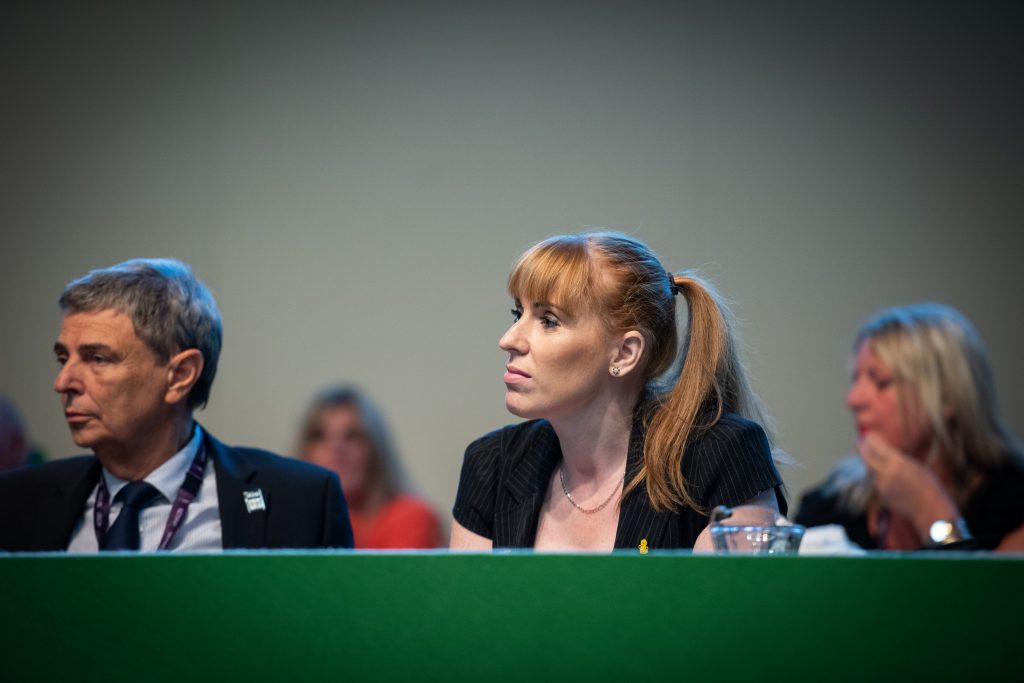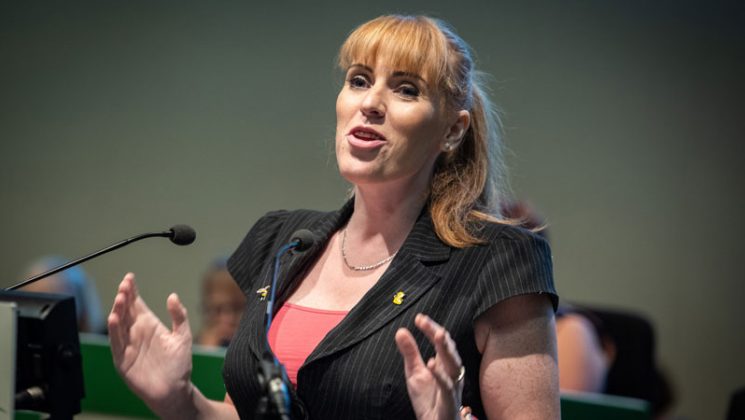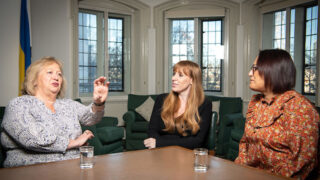Angela Rayner at UNISON’s national delegates conference in 2018. Image: Steve Forrest
Angela Rayner remembers when she first became employed by Stockport Council as a homecare worker. She was still a teenager, a single mum, with little education and scant experience outside her council estate. But she was “already quite bombastic and feisty”. And she made her mark immediately.
“The managers wanted to outsource the homecare service and started discussions about how they were going to do it. I was completely mortified, because I’d only been there a few months. I’d just come from the private sector and I thought, gosh, this is so much better here. You treat staff better, we get more time with our clients, we can look after them. You know, it was really good.
“So I was like, ‘Why would you want to outsource? This is crazy’. And I was explaining this to management. And the girls who I worked alongside said, ‘You should be our union rep’. And I said, ‘What’s a trade union?’ That’s when I joined UNISON and, literally overnight, became the shop steward locally.”
When you talk to the Labour MP for Ashton-under-Lyne, it’s quickly apparent why UNISON is backing her for the party’s deputy leadership. “All my adult life has been with UNISON,” she observes passionately. “UNISON has never left me and I’ve never left UNISON. It’s just part of who I am.”
Hostile environments are ones I’ve been used to
She is also, indelibly, a product of her background, even if it’s one that she had to overcome. Her childhood was impoverished. Both her parents were on benefits, and couldn’t afford central heating, Angela going to her “Nana’s” on Sundays for a bath. There were no books in her home; her mother couldn’t read or write, and was diagnosed bipolar. She was bullied at school (“I was poor, I was a ginger kid, I was definitely going to get bullied”). At 16 she was pregnant.
When a schoolfriend, who she fondly describes as “my best friend to this day”, gave her the confidence to fight the bullies, Angela found she was rather good at defending herself. And the experience instilled something profound in her.
“I think, probably from my childhood, that I have this sense of justice, a desire to speak out for people who are being oppressed and are not being represented. I can’t physically not do it. I feel like I have an obligation to speak for them, because someone did that for me and gave me a voice and gave me confidence to fight for myself.
“I think that’s why I’ve thrived in Parliament, to be honest,” she adds. “If you look at Parliament over the last few years, it’s been absolute chaos. And it’s been quite a challenging period. People have felt discombobulated by the level of anger, the level of disorganisation, the level of attacks. I’ve actually found it… not easy, but a quite natural environment. Hostile environments are ones I’ve been used to, whether that’s growing up on the council estate, or in the union movement.”
She’s clearly a fighter – dynamic, charismatic, with a gleam in her eye and a no-nonsense immediacy to the way she approaches people. (“Most people say I overshare. And most people can say they connect with me because of that.”) She’s definitely someone you’d want by your side.
Back as a teenager, it was sheer determination to prove to everyone that she could make something of herself that led to her becoming a care worker – first with an agency, then the council. When she recalls those years, she describes a perspective on the job that is rarely spoken of, yet seems momentous.
“Becoming a home help meant that I literally started to be treated like a human being,” she says. “Before that, doctors were people that you went to when you were poorly, they were ‘Establishment’. Police were people that told you what to do if you were being naughty. Teachers were people that taught you. These were not people I had conversations or peer-to-peer relationships with, these were authority figures that told me what to do.
“So when I became a home help, I started to look after a professor while he was critically ill and dying. I had never met a professor before then. I was his only contact throughout his last few months. He spoke to me as a human being, not as a scally off an estate. I looked after judges who were very, very vulnerable. These big authority figures suddenly became people to me. They depended on me. And they treated me like I was on the same level with them, in a way that I’d never experienced.
“Before that, professionals interacted with me because they’d done interventions. Now I was the powerful one in the relationship. I suddenly realised that people are not, like, that group here and that group there. They’re very complex. And how you forge relationships with people is important.”
And there was something else. “When I looked after people who were dying, they talked about the time they spent with their families, the fact that they’re proud of their children, not their own success. Their faces didn’t light up about what they’ve achieved, what they’ve got in the bank, their faces lit up when talking about people. It was a lightbulb moment for me.”
I was just nurtured in this bed of activism and politics
That recollection typifies Angela’s character-building approach to her life. And she found a perfect synergy of her life experience with trade union activism.
“UNISON gave me a vocational political education,” she says. “My word, the first ever UNISON conference I went to. I’d never done politics before. It sort of connected everything. Everything that we were suffering around austerity, the cuts, the privatisation, had context all of a sudden. And my mind was just like a sponge. And I took that back to my local campaigning.
“I started as a union rep in the middle of the biggest onslaught of attacks that local government has seen in its history. I was dealing with arms-length management organisations, I fought against the stock transfer – that was one of my first campaigns – I fought against the attacks on the final salary pension scheme, the attacks on pay, against the massive restructuring.
“I found it all massively intriguing,” she smiles, thinking now of the smoke-filled rooms in which she mingled with inspiring union figures. “I was just nurtured in this bed of activism and politics – people politics.”
She quickly rose up the union ranks – young members’ officer, branch secretary, the NEC, regional convenor for the northwest, before feeling that she could make a difference in Parliament. And in 2015 she became the first female MP for Ashton-under-Lyne, defending the seat twice since, including at the last, disastrous election for Labour.
Are you a member of the Labour Party? Read more and cast your vote. Ballot opens Monday 24 February
In the speech announcing her candidacy for the deputy leadership, she said it was the deputy’s duty to understand the reason for the defeat, and put it right. It seems that a hard-headed pragmatism would be immediately installed.
“We have to understand that there’s no point to anything we do as a movement if we don’t mobilise to win power, to make things change,” she says. “We don’t want to be a protest group. We want to affect people’s lives for the better.
“You have to understand the scale of the defeat, in order to then understand that the electorate rejected, ultimately, what we gave them. And there were a number of reasons for that. Brexit was a key issue, which won’t be an issue at the next general election. Our leader was a key issue, and that won’t be an issue at the next general election. And I think the party was very dysfunctional, it was arguing with itself, and when you argue with yourself how can people feel positive about how you can change their lives?
“I don’t think they rejected socialism,” she adds. “We just didn’t put it across as a set of values. We didn’t tell a story. We didn’t tell the Labour story. The messaging and the strategic oversight of campaigning wasn’t there.”
This is where she feels she could use her UNISON experience and training to help steer Labour’s future course. “UNISON taught me about the strategic campaign. I fought against the privatisation at my council, and won, not because I had lovely, warm, cuddly values, but because UNISON gave me the framework and the map to victory.
“I can bring that organising into the Labour Party and empower and inspire and rejuvenate that grassroots campaigning that we need in order to win those victories. And then to have the overarching message.”

With UNISON general secretary Dave Prentis, NDC 2018. Image: Steve Forrest
For Angela Rayner, that message always comes down to people – whether it’s “that thread of feeling in public services that what we deliver is about people”, or her ardent desire “to nurture young people, to let them know that they’re special”, or the people-focussed values that drive her union.
“Everyday socialism. It’s what we do. It’s looking out for your fellow worker, your neighbour – whether that’s community groups, the homeless people in your community, the kids that need the opportunities I needed. To me, all those things are crucially part of that offer. The deputy leader has to energise our great movement and all the wings of that movement.”
Now married, with two more children – and a grandchild – she weighed the pros and cons for her family before deciding to stick her head even further above the parapet, at what has been a difficult, dangerous time for politicians.
“I remember I received the death threat from a serving soldier on the same day that news broke there was a shooting on my road. And my [eldest] son texted and said, ‘Mum are you OK?’ So he made the link.
“My two youngest children [who are 10 and 11] have been taught how to use the panic buttons in my house. Their lives are different. They wanted to set up their own quirky little YouTube channel – that’s what all the kids are doing at the moment – and I had to say no, you can’t, because my profile makes me feel insecure about having my children exposed.
“It’s not just me in the limelight. All my friends and family have to watch people publicly try to punch holes in me. They don’t like it when people see ‘Angela Rayner’ the politician, because they see me as Angela Rayner my daughter, or Angela Rayner my sister, or Angela Rayner my mum.”
The ballot for the Labour Party leadership elections opens on Monday 24 February




I really enjoyed hearing Angela Rayner at Women’s Conference, she talks like a true human being herself and Woman who has worked really hard to progress up the ladder to where she is now. There are not Politicians who inspire me, but Angela is a true inspiration for all of us who have struggled as working single parents and as a Woman with fight in her heart that is balanced with true compassion.
“Unison took me in as a rebel and turned me into a rebel with a cause”
My favourite quote from the whole conference
She is a seasoned deputy leader of the labour party and has earned my support.
Angela is a true inspiration for everyone and she balanced with true compassion